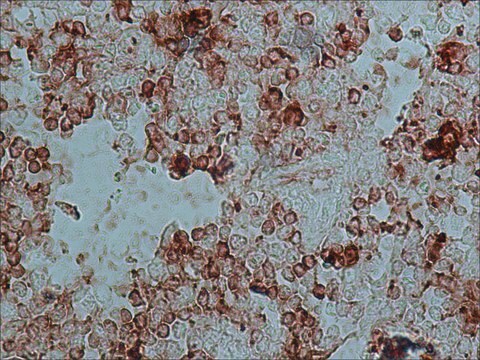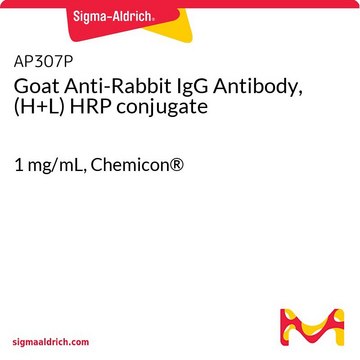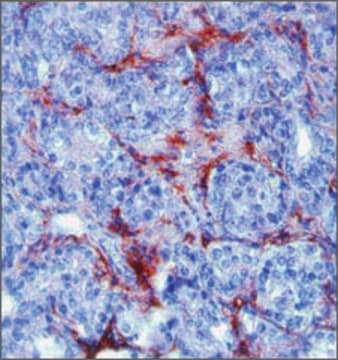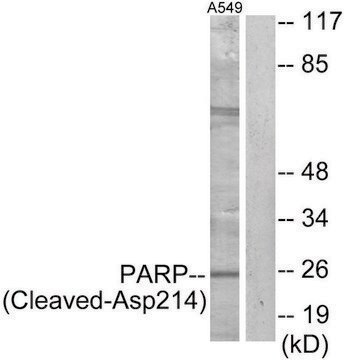401515
Rabbit Anti-Goat IgG, H & L Chain Specific Peroxidase Conjugate
liquid, Calbiochem®
Sign Into View Organizational & Contract Pricing
All Photos(1)
About This Item
UNSPSC Code:
12352203
NACRES:
NA.46
Recommended Products
biological source
rabbit
Quality Level
antibody form
affinity isolated antibody
antibody product type
secondary antibodies
clone
polyclonal
form
liquid
contains
0.02% Thimerosal as preservative
manufacturer/tradename
Calbiochem®
storage condition
do not freeze
isotype
IgG
shipped in
wet ice
storage temp.
2-8°C
target post-translational modification
unmodified
Related Categories
General description
Immunoaffinity purified rabbit polyclonal antibody conjugated to horseradish peroxidase. Recognizes goat IgG, heavy and light chains.
This Rabbit Anti-Goat IgG, H & L Chain Specific Peroxidase Conjugate is validated for use in Direct Immunoassay for the detection of Goat IgG, H & L Chain Specific.
Application
Direct Immunoassay (1:10,000)
Packaging
Please refer to vial label for lot-specific concentration.
Warning
Toxicity: Standard Handling (A)
Physical form
In 10 mM PBS, 0.5 mM EDTA, 10% mannose, 2% sucrose and 1% BSA, pH 7.6.
Other Notes
o-phenylenediamine, 1 mg/ml in citrate buffer, pH 4.5, 0.1% urea peroxide at 25°C, was used as the substrate for testing immunoenzyme reactivity. Monospecific for goat immunoglobulin G, heavy and light chain as determined by immunoelectrophoresis against normal goat serum. Variables associated with assay conditions will dictate the proper working dilution.
Legal Information
CALBIOCHEM is a registered trademark of Merck KGaA, Darmstadt, Germany
Disclaimer
To comply with ban of sale of mercury-added products required by The Interstate Mercury Education and Reduction Clearinghouse (IMERC), this product is prohibited to be sold in the following US states: Rhode Island and Connecticut.
Not finding the right product?
Try our Product Selector Tool.
Storage Class Code
12 - Non Combustible Liquids
WGK
WGK 2
Flash Point(F)
Not applicable
Flash Point(C)
Not applicable
Certificates of Analysis (COA)
Search for Certificates of Analysis (COA) by entering the products Lot/Batch Number. Lot and Batch Numbers can be found on a product’s label following the words ‘Lot’ or ‘Batch’.
Already Own This Product?
Find documentation for the products that you have recently purchased in the Document Library.
Astrid Agorio et al.
Proceedings of the National Academy of Sciences of the United States of America, 114(16), E3354-E3363 (2017-04-05)
"Too much of a good thing" perfectly describes the dilemma that living organisms face with metals. The tight control of metal homeostasis in cells depends on the trafficking of metal transporters between membranes of different compartments. However, the mechanisms regulating
Esther A Guzmán et al.
Investigational new drugs, 29(5), 777-785 (2010-03-31)
Pancreatic cancer is the fourth leading cause of cancer death in the United States, and new drugs to treat the disease are needed. Pancreatic cancer cells are highly metastatic and exhibit resistance to apoptosis. Small molecules that can restore sensitivity
P Comeglio et al.
The Prostate, 74(1), 10-28 (2013-09-17)
BPH and LUTS have been associated to obesity, hypogonadism, and metabolic syndrome (MetS). MetS-induced prostate and bladder alterations, including inflammation and tissue remodeling, have been related to a low-testosterone and high-estrogen milieu. In addition to ERs, GPR30/GPER is able to
Carla Letizia Busceti et al.
Frontiers in cellular neuroscience, 12, 292-292 (2018-09-28)
Dickkopf-3 (Dkk3) is an atypical member of the Dkk family of Wnt inhibitors, which has been implicated in the pathophysiology of neurodegenerative disorders. However, the role of Dkk3 in mechanisms of cell degeneration and protection is unknown. We used Dkk3
Benjamin R King et al.
Journal of virology, 91(15) (2017-05-26)
Arenaviruses are enveloped negative-strand RNA viruses that cause significant human disease. These viruses encode only four proteins to accomplish the viral life cycle, so each arenavirus protein likely plays unappreciated accessory roles during infection. Here we used immunoprecipitation and mass
Our team of scientists has experience in all areas of research including Life Science, Material Science, Chemical Synthesis, Chromatography, Analytical and many others.
Contact Technical Service








